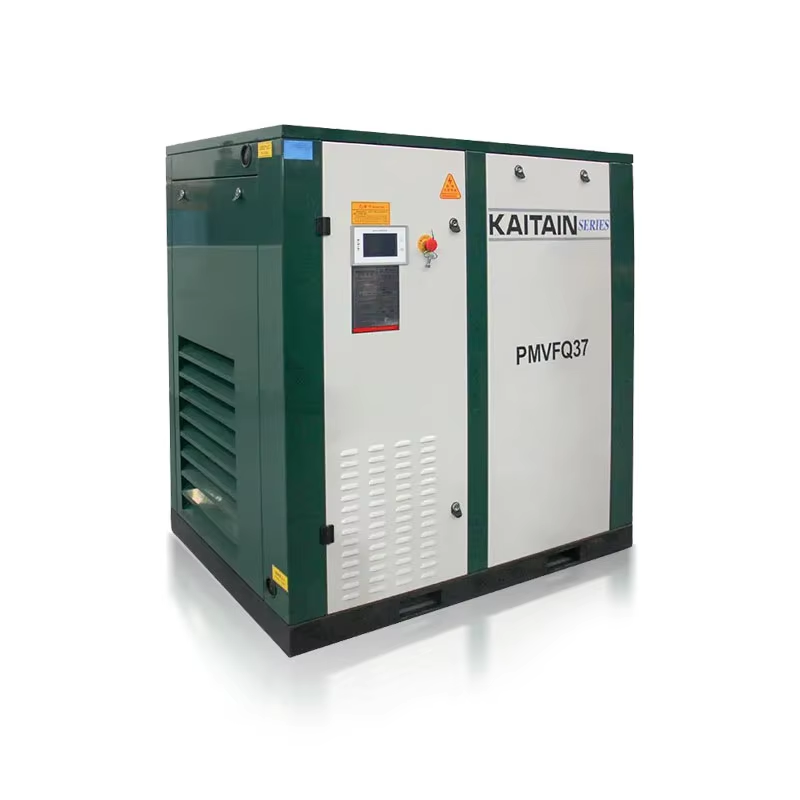Understanding Air Compressor Machine Efficiency
What Defines Air Compressor Efficiency?
How efficient an air compressor runs really matters when looking at its overall performance. Basically, efficiency measures what portion of the electricity going in actually gets turned into usable compressed air. When we talk about percentages here, it tells us exactly how good the machine is at converting power into air pressure. A lot depends on things like how the compressor was built, what kind of workload it handles regularly, and which technology powers it up. Rotary screws versus reciprocating models make quite a difference too. Some newer tech has made big strides in recent years though. Variable speed drives for instance have boosted efficiency numbers by around 25% or so in many cases. For companies running multiple compressors day after day, getting familiar with these efficiency factors can lead to real savings on their bottom line while also improving system reliability across operations.
Key Metrics: CFM, PSI, and Energy Consumption
Getting air compressors to work at their best starts with knowing some basic numbers: CFM which stands for Cubic Feet per Minute, PSI meaning Pounds per Square Inch, plus keeping an eye on how much power they actually consume. The CFM tells us how fast air moves through the system, so it matters a lot when picking out equipment for different jobs around the shop. Meanwhile, PSI shows what kind of pressure builds up inside during operation. Finding that sweet spot where both CFM and PSI match what's needed makes all the difference in running things smoothly. We've seen facilities where compressors eat up almost 30% of total electricity bills, which really highlights why tracking those energy figures helps spot problems before they become big money drains. When companies pay attention to these key indicators, they not only keep their machines running better but also save serious cash over time.
How Inefficiency Impacts Business Operations
When air compressors aren't running efficiently, businesses pay the price through higher operating expenses and lower output. Poorly functioning systems can push energy bills up as much as half compared to well-maintained ones. Old machinery or neglected maintenance leads to all sorts of problems on factory floors. Production lines stall, deadlines slip, and whole departments get disrupted if nothing gets fixed. Companies need to check their compressor setups regularly and invest in upgrades where needed. This kind of proactive approach keeps things running smoothly and maintains a competitive edge in manufacturing circles. Fixing these issues early saves money on electricity while keeping production levels steady over time.
The Financial Impact of Air Compressor Efficiency
Energy Costs: The Hidden Expense of Inefficient Systems
For many industrial facilities, energy bills often end up being the biggest monthly expense when it comes to running air compressors, something both manufacturers and plant managers tend to ignore until it's too late. Studies show there's actually quite a bit of money waiting to be saved here too. Just bumping efficiency ratings by 1% can cut annual power costs around 3%, which adds up fast over time. The point isn't just theoretical either. Companies that regularly check their compressor performance find ways to save thousands each year through simple tweaks and occasional equipment upgrades. Most plants have no idea how much they're wasting on hidden energy drains, so conducting regular system assessments makes good business sense while also helping reduce environmental impact in the long run.
Maintenance Savings from Optimized Performance
When air compressors run efficiently, they put less strain on all those moving parts inside, which means the whole system lasts longer between repairs and replacements. Maintenance bills tend to shrink quite a bit too. Some studies show businesses cutting their regular maintenance spending by around 40% once they upgrade to better performing equipment. Fewer breakdowns translate to fewer unexpected costs showing up on the bottom line. That makes planning for future expenses much easier since there aren't constant surprises coming from malfunctioning systems. For manufacturers who want their operations running smoothly day after day, getting the most out of their compressors isn't just good practice it's practically essential for keeping production lines moving without unnecessary interruptions.
ROI of Upgrading to High-Efficiency Models
Most businesses see a positive return on investment when they switch to high efficiency air compressors, usually somewhere between 12 to 36 months after installation. Many manufacturers and local utilities offer cash back programs and other financial perks that help cover those upfront expenses. Companies that plan ahead with these upgrades often find themselves saving money month after month, which gives them an edge over competitors still using older equipment. For manufacturing plants especially, going green isn't just good for the environment anymore it's becoming essential for staying competitive. High efficiency models cut down on energy waste and maintenance costs too, making them smart investments for shop owners looking at both their bottom line and carbon footprint reduction targets.
For more information, explore details about various air compressors, such as this Air Compressor Machine, which offer innovative solutions to enhance performance and reduce energy consumption.
Efficiency's Role in Production Reliability
Reducing Downtime Through Consistent Airflow
Having good airflow matters a lot for keeping production running smoothly, especially since efficient air compressors help prevent system shutdowns. Plants that work on getting their compressor systems right often see around 25% fewer surprise breakdowns. Fewer stoppages means better day to day operations and less disruption in what gets produced. Regular checks and proper maintenance go a long way toward keeping air flowing consistently through the system. Most manufacturers find these practices pay off handsomely over time as equipment lasts longer and workflow stays steady without constant interruptions.
Pressure Stability in Critical Manufacturing Processes
Keeping air pressure steady matters a lot in factories where products depend on just the right amount of compressed air. When pressure drops even a little bit, things start going wrong fast - think cracked parts, misshapen components, all kinds of defects that pile up as waste and eat into profits. That's why many plants invest in better compressors these days. These upgraded systems help maintain that sweet spot of pressure throughout shifts, so what comes off the assembly line looks good and works properly. Stable pressure isn't just about avoiding problems though. It actually makes operations run smoother overall, cutting down downtime and saving money in the long run for manufacturers who care about both their bottom line and customer satisfaction.
Case Study: Automotive Assembly Line Improvements
Looking at what happened at a major car factory gives us a good look at how important efficient air compressors really are for production results. When this particular plant upgraded their air compressor system, they saw productivity jump by around 30%. The improvements came from installing better monitoring equipment that spotted where things weren't working right. Workers could then make smart changes to fix those problems, which cut down on energy usage by roughly 20%. What we learn from this real world example is pretty straightforward: companies that invest in better air compressor tech typically see real gains both in output and energy savings over time.
Sustainability and Regulatory Advantages
Meeting Carbon Emission Targets
Air compressors that work efficiently help cut down on carbon emissions, something many companies need to hit those sustainability goals set by various government bodies and industry groups. When businesses switch to these high efficiency models, they actually manage to bring down their carbon footprint quite a bit. And let's face it, this matters more than ever when it comes to meeting those corporate social responsibility expectations. The Environmental Protection Agency has shown through its research that better industrial energy efficiency leads to real reductions in greenhouse gases. So basically, getting good at running air compressors isn't just about saving money on power bills anymore it's becoming a key part of any company serious about going green.
Complying with Global Energy Standards
With regulations getting tighter all the time, sticking to global energy standards has become essential for businesses operating air compression systems. When companies meet these requirements, they not only dodge fines but actually boost their image in the marketplace. People today tend to support brands that show real commitment to going green. Non-compliance means facing serious financial consequences, which makes investing in better air compressor tech absolutely necessary for most operations. Following these energy guidelines matters because it helps keep air compressors running sustainably across manufacturing, construction, and other industrial sectors where compressed air is part of daily operations.
Green Tax Incentives for Efficient Systems
When governments offer tax cuts and rebate programs, many businesses find it easier to switch out old compressors for newer, more efficient ones. These kinds of incentives really help cut down on the costs that come with upgrading equipment. According to what various energy agencies have observed, companies participating in efficiency initiatives tend to save money over time while also becoming greener operations. Going for air compressors certified under strict efficiency standards brings two main advantages at once: lower operating expenses and reduced environmental impact. For manufacturers trying to stay ahead in today's tough marketplace, this kind of investment makes practical sense as well as ecological sense.
Future-Proofing with Smart Air Compressor Technology
IoT-Enabled Monitoring for Real-Time Efficiency
Bringing IoT technology into air compressors is changing how we think about efficiency in real time. With smart sensors monitoring everything from pressure levels to temperature fluctuations, plant managers can spot problems before they become costly breakdowns. The constant stream of data lets operators see patterns over weeks and months, making it easier to plan maintenance schedules and avoid unexpected downtime. Some manufacturing facilities have actually seen their energy consumption drop by around 15% after implementing these connected systems for diagnostics and performance tracking. What makes this so valuable is that companies aren't just reacting to issues anymore but anticipating them, which saves money while also reducing waste across the entire production process.
AI-Driven Predictive Maintenance Trends
AI tech is changing how maintenance works, especially when it comes to air compressors. Companies now have these smart systems that let them spot problems with compressors before they actually break down. The ability to predict issues makes all the difference. Some research shows businesses saving around 30% on maintenance expenses just by catching problems early instead of waiting for breakdowns. For manufacturers looking at long term savings, this kind of proactive approach fits right into what industries need today. When factories avoid unexpected stoppages and plan maintenance smarter, everyone wins. Productivity goes up and operations stay running smoothly without those frustrating interruptions we all hate.
Market Growth: Projected Demand for Efficient Models
More and more businesses are looking for better air compressors that save money on electricity bills. The market for these machines has been growing steadily lately. Industry reports predict around 5% yearly growth rate for the coming five years worldwide. What does this mean? Manufacturers are rushing to develop compressors that waste less power while still getting the job done right. Companies that invest in newer models now will probably see savings down the road. Some factories have already switched to variable speed drives or oil-free systems which cut costs significantly. As demand keeps rising across manufacturing sectors, smart businesses are positioning themselves early to benefit from these technological improvements before competitors catch up.
Table of Contents
- Understanding Air Compressor Machine Efficiency
- The Financial Impact of Air Compressor Efficiency
- Efficiency's Role in Production Reliability
- Sustainability and Regulatory Advantages
- Future-Proofing with Smart Air Compressor Technology
- AI-Driven Predictive Maintenance Trends
- Market Growth: Projected Demand for Efficient Models

